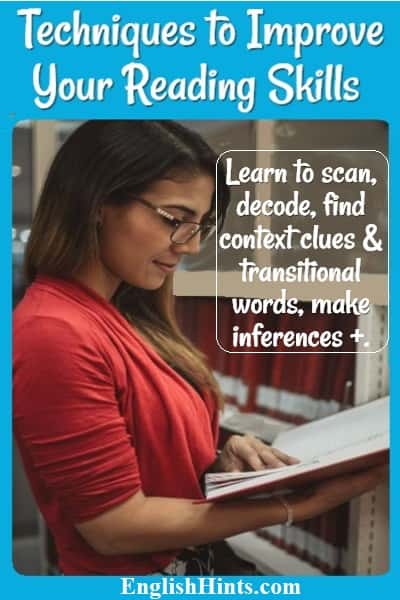Improve Reading
Skills
with These Proven Techniques
Improve your reading skills, fluency, and comprehension with a few simple techniques.
These include
- scanning and skimming,
- “chunking,”
- word analysis and decoding,
- using context clues,
- recognizing sequence markers and transitional words,
- and making inferences.
Scanning, Skimming, and Chunking
Scanning is taking a quick look at a text. When you scan, you note its basic organization. Sometimes you're looking for a specific name, date, word, or fact.
You study the title and subtitles or headings, pictures, graphs, and highlighted information. These prepare you to understand and remember the text's main topics.
If you are looking for specific information, scanning can help you decide whether a particular text might be useful, and where to find that information.
Skimming is also a quick look through a section of text to get its main idea, or sometimes to find important words. Skimming looks at the text in a little more detail than scanning does. You want to get a general idea of the content without reading every word.
See Practice Scanning and Skimming for Information.
Chunking is reading groups of words at a time, instead of stopping at each individual word. It increases reading comprehension, fluency, and efficiency. That's because you focus on the author’s ideas instead of thinking about or translating each word.
Word
Analysis

Word Analysis Skills can help you figure out the meaning of new words. Analysis may include recognizing the parts of a long word (prefixes, roots, or suffixes). Another way to find out if a word is familiar is by decoding its pronunciation using phonics. (Phonics is all the sounds different letter combinations make in English.)
For more on word analysis, see List of Prefixes, List of Suffixes, and 50 Word Roots from Latin.
For the sounds that English letters represent, see ESL Phonics, English Vowels, English Vowel Digraphs, and Consonant Digraph Sounds.
Context Clues
Context Clues can often help you recognize the meaning of an unknown word. Sometimes a text will define, explain, or give examples of an important word or concept. This is especially likely in introductory textbooks. (These are books that introduce a subject to students who aren't familiar with its specialized vocabulary.
At times there may be no clear definition or examples of a word. The sentence or sentences around it will often give clues to its meaning too. The context surrounding a word can also show its connotations (positive or negative feeling). Context can also show its exact use when a word has more than one meaning.
You can improve your use of context clues with practice. When you find an unknown word, try to figure out its meaning from the surrounding words before you look it up. Then see how well you guessed. This will also help you remember the word better after you look up its meaning.
Using Sequence Markers & Transition Words
Recognizing Sequence Markers and Transition Words can help you understand the way a text is organized. Here are some (of many) words showing:
Sequence or Order
first
second
third
next
then
after that
last of all
finally
Cause & Effect
therefore
thus
since
as a consequence
consequently
so
it follows that
Contrast
though
although
even though
however
but
while
nevertheless
on the other hand
All these words can help you follow the author’s reasoning. You can see the transitions between ideas without getting lost in the details.
Improve Reading Skills with Inferences
Making Inferences is drawing conclusions about an author's complete message. (That often includes thoughts he or she may not be state explicitly.) In any text the author will clearly state some facts or opinions. There are other ideas he or she will only hint at or imply.
(This is similar to speaking. Part of our message is expressed by tone of voice, facial expression, and gestures-- not just by our words.) A reader makes inferences or judgments based on the author’s words and the story’s background.
The short video below gives several examples of inferences-- in daily life and based on evidence in a text. (Unfortunately, it's too big to show on most mobile phones. Sorry!)
Here's a historical example from Federalist #1. It was written in 1787 to encourage the
adoption of the U.S. Constitution.
“Candor will oblige us to admit that even such [ambitious] men may be actuated by upright intentions; and it cannot be doubted that much of the opposition which has made its appearance, or may hereafter make its appearance, will spring from sources, blameless at least, if not respectable--the honest errors of minds led astray by preconceived jealousies and fears.”
The writer says that even men who would benefit if the Constitution is defeated may still have honest reasons for opposing it. (He had discussed these men in the paragraph before this sentence.)
He also says that much of the opposition (to the Constitution) is based on honest misunderstandings and fears. However, he strongly implies that opposition to the Constitution is misguided (wrong).
We can infer that he believes people will support the Constitution if they listen to reason instead of emotion.
More Practice to Improve Your Reading Skills
There are lessons teaching many of these reading skills in 'Word Detectives.' See Reading Comprehension Lesson Plans.
It's also possible to practice and improve these reading skills on EnglishHints. For skimming and then analyzing a reading passage on mental health, see the Quiz in Check your Reading Skill. See English Reading Comprehension Strategies for ways to understand a reading selection. (It discusses ways to focus on it before, during, and after the reading itself).
You can skim or scan the reading materials recommended on Comprehension Exercises. Try using decoding and context clues with any words you don't know. Look for transition words to help you recognize the main points and follow their logic. Then check your understanding with a comprehension quiz (for many of them.)
No one uses all these skills with every reading selection. However, being able to use them when needed will help you read more efficiently.
They will increase your reading comprehension and enable you to find the information you need more quickly. They'll make reading in English more enjoyable, too. It really is worth the time it takes to improve your reading skills!
Home > ESL Lesson Plans > Improve Reading Skills.
Didn't find what you
needed? Explain what you want in the search box below.
(For example, cognates, past tense practice, or 'get along with.') Click to see the related pages on EnglishHints.
| site search by freefind | advanced |






